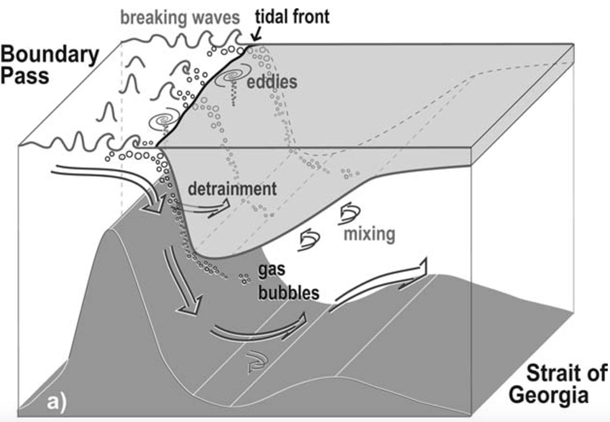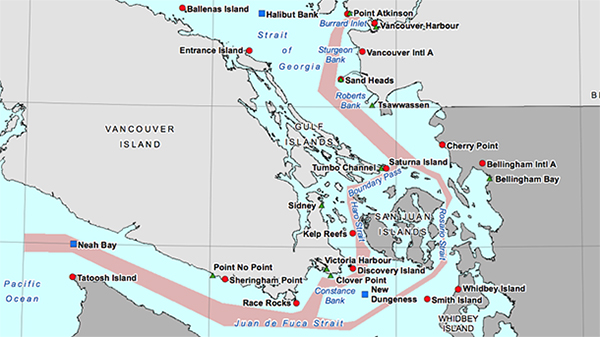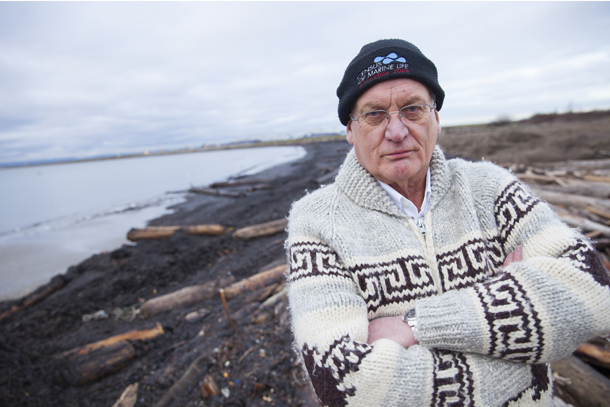An oil spill catastrophe imagined by Kinder Morgan will take centre stage at National Energy Board hearings this week in Burnaby as a retired government ocean scientist questions the company's cleanup scenario.
The Texas-headquartered company first reported its "credible worst case" spill scenario in 2013 as part of the risk assessment for its proposed expansion of the Trans Mountain Pipeline capacity.
The scenario reads like a Hollywood disaster script.
An oil supertanker, loaded with Albertan diluted bitumen from Kinder Morgan's Westridge Terminal in Burnaby, sets sail from the Port of Vancouver.
It's an Aug. 17 evening with light winds and fair weather. The supertanker rounds Boundary Pass east of Vancouver Island at 10 p.m. The giant vessel -- two football fields in length -- attempts a sharp turn southeastward in Haro Strait when something goes wrong.
The captain encounters "unspecified" troubles. Despite an attendant tug, the tanker powers straight into a rock formation called Arachne Reef just west of Stuart Island -- a spot popular for divers.
The reef rips the supertanker open. The ship's hold gushes 103,700 barrels of toxic dilbit into dark, turbulent waters. Twenty-five per cent of the cargo is lost in the first hour.
Emergency vessels rush in with booms to contain the expanding slick, as the dilbit -- the industry term for diluted bitumen -- keeps flowing from the hull for 13 hours. Self-propelled skimmers attempt to suck up the surface oil. It's all they can do.
"Only the removal of oil from the water surface is quantified," write Kinder Morgan's modellers.
The result of this "plausible but highly unlikely event" is a "45 per cent recovery of the oil lost at sea," the company maintains.
If the worst-case scenario happened, it would be an environmental disaster of the first order, a spill equal to about 40 per cent of the volume lost in the Exxon Valdez disaster. Beaches would be soaked, aquatic environments ruined and environmentalists' fears realized.
Role of tidal fronts 'not trivial,' scientist says
Yet even Kinder Morgan's worst-case scenario might underestimate the cleanup challenges, argues physical oceanographer David Farmer. The retired scientist is set to critique the company's disaster scenario Tuesday at the National Energy Board's hearing into the pipeline expansion project.
"Once [the oil] is dragged beneath the surface, you're not going to recover it," he said in an interview with The Tyee.
The problem for cleanup efforts, he said, are B.C.'s tidal fronts -- places where a shoreline's brackish waters collide with incoming dense tidal waters. The result is a complex process called subduction that sucks surface materials deep below the surface.
"If you can get a spill anywhere near these tidal fronts, there's a real possibility a significant amount of oil can be drawn beneath the surface, stirred into the environment, and become unrecoverable," said Farmer, who worked for 27 years with the Institute of Ocean Sciences in Sidney B.C.

"In the fronts we studied we found surface water could be subducted to 100 metres depth or more. This should have been considered, and it wasn't," he said. "It's not trivial."
The tidal fronts can be hundreds of metres or even kilometres long, and are recognizable on the surface as lines of breaking waves, Farmer said. They are found all over the province's coastlines. And there's a big one right where Kinder Morgan's imagined its worst disaster, he said.
The front could obliterate the spilled dilbit into tiny droplets that would disperse with the currents, causing problems for aquatic life, he said.
In a detailed response, Kinder Morgan called Farmer's oceanic analysis "interesting," but not a significant concern.
"These are not particularly large waves, and one wonders if they have sufficient energy to break the oil slick into droplets, and then inject these droplets into the water column to a sufficient depth where they are caught in the subducting flow," the company's consultant writes.
Farmer said the company response is "seriously incorrect." He is presenting to the NEB hearing at the Delta Burnaby Hotel and Conference Centre on Tuesday afternoon. His presentation is online.
Dilbit report denied
Farmer is also concerned about the effect of dilbit droplets on aquatic life. "As they enter the food chain they could become trapped in small organisms and could be consumed by fish, including commercial species," he said. "Even if the fish aren't tainted, people will think they are. So there's marketability issues."
Spills of dilbit also add risk to the endangered southern resident killer whales and other marine mammals that already suffer from acoustic interference, he added. Tankers will worsen that noise.
Concerns over the increasing number of ocean tankers hauling oilsands diluted bitumen prompted the U.S. Congress to ask the National Academy of Sciences to produce a definitive report on the safety issues. It published the study in late 2015.

Two NEB intervenors -- Raincoast Conservation Foundation and the Living Oceans Society -- urged the board to consider it as evidence. Kinder Morgan protested, and on Dec. 17 the NEB denied the request.
"This is the first report that says whether it's safe to move [dilbit at sea] around or not. It's absolutely critical to an intelligent assessment of this pipeline," Farmer said.
The U.S. report warns that dilbit is far more likely to sink in marine spills than crude oil. As a result, responders have a "significantly shorter" time to deal with the spilled oil, the report states.
Ocean cleanups of dilbit spills are "highly problematic" it concludes, because there are few effective techniques for detection, containment and recovery of sunken dilbit.
Kinder Morgan states that it chose the Haro Strait for its disaster scenario because of the complexity of its surface currents, varying tides and navigational issues, including many pleasure craft. "Adverse weather conditions did not prevent or complicate an [oil spill] response," it also noted.
The company's report also said that oil-laden tankers through Boundary Pass and Haro Strait are escorted by tethered tugs, so a powered grounding has a "low probability." ![]()
Read more: Energy, Environment

















Tyee Commenting Guidelines
Comments that violate guidelines risk being deleted, and violations may result in a temporary or permanent user ban. Maintain the spirit of good conversation to stay in the discussion.
*Please note The Tyee is not a forum for spreading misinformation about COVID-19, denying its existence or minimizing its risk to public health.
Do:
Do not: